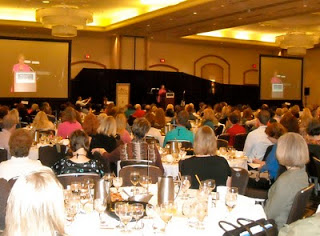 The famous Gateway Arch was across the street from the Hyatt Regency hotel where we met. The famous Gateway Arch was across the street from the Hyatt Regency hotel where we met. Christian fiction is ministry. Christian fiction is business. We heard both at the recent American Christian Fiction Writers conference in St. Louis, Missouri. As I wrote on another blog, the conference was bathed in prayer both before and during. We had wonderful times of worship, aspiring writers and published authors side by side, working together to advance the Kingdom of God. Author and agent Terry Burns taught a great workshop on using Christian fiction to reach unbelievers. He said you can’t write a “crossover book” (one written for the Christian marketplace that is picked up by secular markets.) It is something that just happens. You have to write for one audience or the other. The Christian audience expects faith issues to be introduced in the first three chapters. If an unbeliever is confronted with faith in the first three chapters, he puts the book down. After all, Burns said, spiritual conviction is not comfortable. To reach the secular audience, faith has to be such an integral part of the story that it sneaks up on them after they are fully invested in the characters and committed to seeing how they solve their problems. And it can’t feel preachy. He reminded us that our stories will probably only take readers a little way on their spiritual journeys. Our stories are part of something bigger that God is doing in their lives.  Writing is also a business. Publishers can’t afford to edit, print and distribute books they can’t sell. Most writers have a habit of eating three times a day and work best with a roof over their heads. Sales and money are not irrelevant. This is a sore point for me. Most of my books have been very favorably reviewed, but none of them have been great sellers. “Yeah,” someone at conference quipped. “ ‘Critically acclaimed’ is a euphemism for ‘doesn’t sell.’ ” A backlist of well-reviewed poor-sellers doesn’t help me to get a publisher’s attention for my current projects. I tried to be a listener in these conversations, not to defend myself or my writing, but to figure out what I can do to make a difference. My goal was to find an agent to replace Etta Wilson, who retired in December. One interview was a dud. To that agent my lack of sales were an indication that I didn’t have my finger on the pulse of what teens today want to read. I got the impression she was looking for writers who could turn out multiple volumes of high school fluff per year. Not my thing. Another agent’s bio had stood out to me on the conference website before I recognized her name as Etta’s first choice to work with me. I had already approached her and been turned down because she doesn’t do YA. At the time I registered for the conference, I was working on what I thought would be an adult version of this story. “Why not?” I told myself and put this agent’s name at the bottom of my list of possibles. “If I do get an interview with her, it will be a God-thing.” In the meantime a publisher has expressed an interest in the book—as YA. The agent showed up at the top of my list of interviews. I refrained from telling her she was obviously God’s first choice, too. We hit it off quite well, sharing a passionate dislike of high school fluff, which I gathered is her main reason for avoiding YA. In the end she asked me for a copy of the full manuscript—not just the proposal and sample chapters. Maybe she’ll change her mind.
1 Comment
LeAnne
1/7/2015 07:40:14 am
This post was moved from another site. All comments were lost.
Reply
Leave a Reply. |
AuthorLeAnne Hardy has lived in six countries on four continents. Her books come out of her cross-cultural experiences and her passion to use story to convey spiritual truths in a form that will permeate lives. Add http://www.leannehardy.net/1/feed to your RSS feed.
To receive an e-mail when I post a new blog, please subscribe.
Categories
All
Archives
November 2022
|

 RSS Feed
RSS Feed